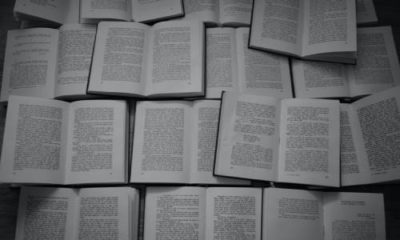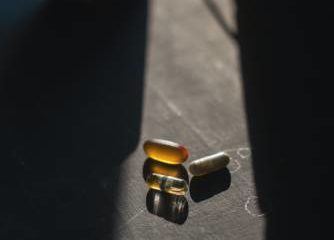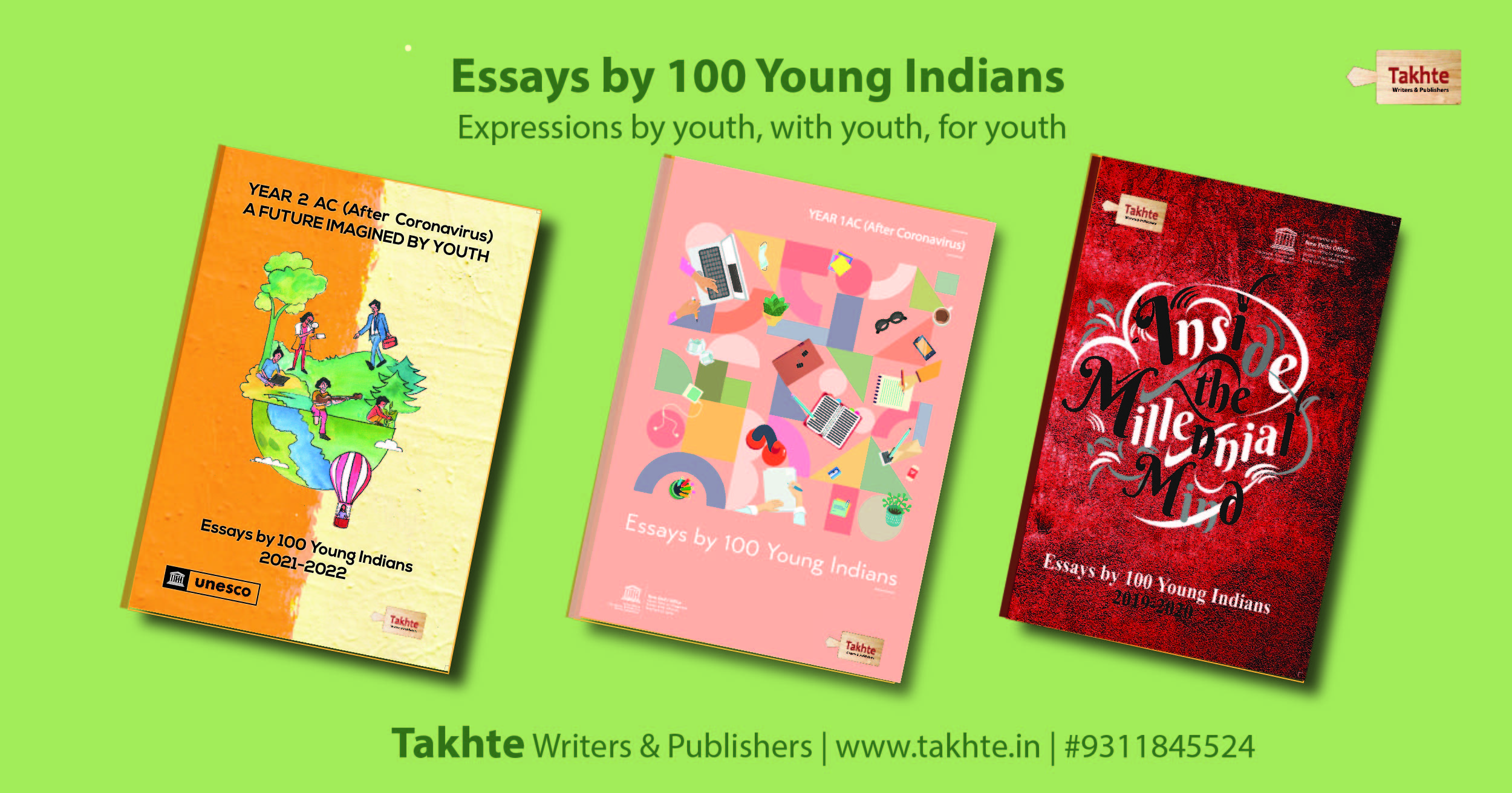Short-story
In the Not-so-Distant Future

Yazhini Sathiamoorthy
Stanes School, Coimbatore, Tamil Nadu
I walk into the office wearing fresh, white clothes that I knew would soon be soaked in sweat. It is just seven in the morning, but the sun is shining brightly, as if in mockery of everything under it – sunscreens, scarves, air-conditioning, and white clothes.
In the office too, everybody is clad in white. But if you observe closely, the white is not uniform. Instead, it has varying shades like clouds. The only difference is that while clouds can be deceptive, these clothes are not necessarily so. For instance, the lady who operates the housekeeping robots is wearing slightly dirty-white clothes, the woman at the reception sports a spotless white dress. In contrast, the man who is the office’s face is shining in an unbelievably white suit that is almost blinding.
This is the man who enjoys his job the most here, I mutter under my breath; he gets his clothes dry-cleaned with fossil fuel derivatives and then announces live updates of carbon emissions twice a day to the entire country. I am talking about Suraj, the boss, the person nearly everybody in my team despised.
We work in the Meteorological Department. My team and I watch the wind warily and note every stray drop of water freed from the moody clouds and handle all the equipment and data associated with the weather forecast. Suraj, on the other hand, just has to throw up all the information we painstakingly gather out of thin air and troubled waters on the television.
Television? You must be asking. Yes, streaming content using mobile phones is not feasible in the 2050s. Climate change has devastated wi-fi networks. So, Suraj appears live on the television in the morning and in the evening to update weather and pollution levels.
When I was a schoolgirl, there used to be a distinction between ‘weather’ and ‘climate’. The weather was the atmospheric condition at a place at a particular time, whereas climate was the long-term weather pattern in an area. Now, the weather that we forecast is the climate that some of my books grimly predicted years ago.
Anyway, the worst thing about Suraj is his annoyingly irrevocable bossiness. The only guy who can order him about is the cameraperson. Haughtiness must be his middle name. At the end of the daily update, the end credits carry Suraj’s name, obviously followed by those of the production, design, and technical work team members. My team is totally excluded. We are the very people who keep the live updates running, and our research was not even acknowledged!
When I joined the Department as a scientist, I was aghast at this treatment. My colleagues said that this is the way it has always been. Pavan, the coordinator, told me that protesting is of no use. Still, I had tried talking to Suraj about it, but he refused outrightly and declined to divulge the reason behind his decision. He remained unyielding even when I threatened to sue him.
Then I decided that I couldn’t let one insane man stop me from being in touch with both science and people. I continued to work as my colleagues did. I immersed myself in understanding the molested Earth. Presently, I am tracking the atmospheric conditions and pollution levels better than my own menstrual cycle. For that matter, climate change hasn’t left that unaffected either. It is as erratic as rainfall.
Some of my colleagues joke about Suraj not giving credits to us. Pavan said that it felt like being undercover agents trying to solve a crime mystery. Yes, indeed, I thought, but why have undercover agents solved the most well-known, open-and-shut case? All of us know that it is climate change, and we are the ones who are responsible for it. Where’s the mystery in that?
The live is due in a few minutes. Suraj adjusts his clothes. He is uncharacteristically sweating. The date appears on the screen, 1 April 2052. After the customary greeting, Suraj looks into the camera and recites the temperatures, the week’s highest. My eyes move from one word to the other on my screen as he goes on. He comes to humidity and the winds.
“Heavy rainfall can be expected in the evening today because of low….” As soon as these words were spoken, I felt as if lightning struck my spine. I search in the pages wildly to see if I had made such an awful blunder. It is a blazing hot day, and there is no possibility of a downpour. Even if there were showers, they would have been acidic, and the people should have been asked to wear acid-resistant gear and not white clothes. I am going to be fired, I think bitterly.
“I’m truly sorry, folks, but Happy April Fools’ Day,” Suraj says brazenly. I stare at him as he continues with the rest of the report. I clench my jaws in an effort to keep quiet till life gets over. Another bolt of electricity jolts me as I hear him say, “From tomorrow, folks, Dr Varsha will be presenting the live weather updates on Climecast. Till then, take care and wear a mask for the air quality is poor. This is Suraj signing off.”
I turn to the cameraperson to see if this had been recorded. The surprised look in his eyes reflects mine in reply. I see Suraj looking at me, least apologetically. Pavan, too, nods at me. I forget whatever I had thought of telling him about the stupid April Fools’ joke. What he just finished saying has left me blank. I know he wouldn’t take that back even if it was not recorded. So, subconsciously, my mind begins to prepare for the next day’s events.
Suraj ambles over to me as if nothing untoward happened and says, “You’re going to be introduced in tonight’s broadcast. Better get ready and do something with that curly hair of yours. It’s going to hide the entire Bay of Bengal on the screen otherwise.”
“Why” would be the most irrelevant question that you can ask Suraj. I remark, “So, you’re going to change my name to Suraj, aren’t you? So that your name still appears in the end credits.” He smirks, “No, that won’t be necessary. You can remain Varsha.” As if he had any other option, my name was going to appear on the television tomorrow.
That evening, when I got introduced live by him as the weather reporter for the foreseeable future of which the length was unknown to me, I noticed that Suraj smelt strongly of detergent. What I had been assuming turns out to be wrong. He didn’t get his clothes dry-cleaned.
After it is over, I manage to smile with difficulty. I am qualified enough to present the weather updates and even have a certification, but I have no experience, thanks to Suraj. The question “why” he did this out of the blue is still beating futilely at the back of my mind.
“I will not be coming tomorrow,” he says expressionlessly. Again, I am stumped because I cannot ask him why. “All the best, Varsha.” I nod meekly and see him turn and walk across the corridor towards the semi-permeable automatic door where his electric car was waiting outside. Before the car could open for him, he collapsed, like a hailstone falling into the fire.
I am standing in front of the camera, sweating. I start like Suraj always does. I find my throat dry. It is still so, but today it is parched. I continue, brushing aside my apprehensions of what would happen if the weather suddenly changed, while I am speaking.
“Today’s minimum temperature stands at 49 degrees Celsius and the maximum at 55 degrees.” I feel the temperature in the room rise as I hear the telephone ringing at a distance. Must be something about him.
“Office-goers and school children in metro-cities are advised to wear white this week to protect themselves from the sun’s rays which are presently high on ultraviolet radiation.” I breathe heavily, “Climecast will be back with live updates on heatwaves and ocean currents after a short commercial break.”
While the advertisement for a photosynthesising mask that could absorb almost all wavelengths of light is being aired, I step down wearily. I shudder at the thought of breaking more bad news. There is a cyclone advancing in the Bay of Bengal that has the capacity to submerge yet another chunk of Odisha. Rajasthan is going to be under the attack of heatwaves. This is harder than I ever imagined.
“Hey Varsha, you’ve got to be back now.” A colleague’s voice shakes me. I brace myself to carry on. After all, it is just a matter of twenty minutes twice a day. How wrong I was. As soon as it is over, I head straight to my cabin, not even caring to see the end credits, but Pavan stops me on my way. “Good job, Varsha, but I have some news for you. It’s up to you to decide whether it is good or bad. That is your cabin from now onwards,” he says, pointing towards Suraj’s workplace, “Let’s talk over there.”
I followed him, numb with shock. Pavan came straight to the point, “Suraj is severely ill. Lung issues, air pollution, of course. It was bound to happen, anyways.” He sighs.
“Why? What do you mean it was bound to happen?” I demand, sitting on the edge of the chair where Suraj used to sit.
“Well, maybe you didn’t know, but he visited all the places which were fraying at the edges due to bad weather. If he had reported it, he surely went, otherwise also, he would go. He doesn’t go anywhere else. This is Suraj’s home.” He looks down and says no more.
But I press on. “Why did he do that?”
“Maybe putting himself in the thick of the things made him feel less like being in an ivory tower. You know how famous he is, how many calls he receives, don’t you?” Pavan asks, now looking right into my eyes.
“Why, Pavan? I don’t understand!” The telephone on the table starts ringing.
“Suraj’s wife is suffering from solastalgia; badly depressed. She doesn’t want to see him anymore.”
I can’t think of anything to say. There was a photo of her on his table. The telephone is still ringing ominously.
“You have to answer it. You are the one in charge now. Suraj said so.” Pavan asserts and gets up.
I pick up the receiver and listen. Varsha…
I run across to Pavan. He is chatting with my team. Keeping my voice as steady as possible and holding back the tears, I announce, “Starting from this evening’s live, only my name appears in the end credits. This is strictly not negotiable.”
It has been a week since I was first aired live on television. Suraj is still in the hospital. The doctors say that he hasn’t got just one or two toxins in his body but many. Apparently, he had even kept his car window open during his tedious travels. He had been a walking storehouse of air pollutants. I make up my mind to visit him.
Suraj had been admitted to a speciality hospital for diseases associated with pollution. I walk inside. There are many patients in differently-coloured hospital gowns. Red, orange, yellow, and green. Colours of the rainbow, you might assume. No, there aren’t many rainbows. In fact, children don’t study about rainbows in school anymore. Rainbows are synonymous with dinosaurs and dodos.
They are the colours of the Air Quality Index. Dark red is for severe, while dark green stands for good. I ask for Suraj. The nurse’s face lights up as she recognises me immediately. She points towards a pale-faced man clad in a dark red gown. I walk up to his bed. There is an oxygen cylinder nearby, as tall as him. But Suraj seems to have shrunk in size. I could only smell disinfectant, not detergent.
Not being able to stand there anymore, I come out, feeling dizzy. I see an emaciated woman sitting under the banyan tree in the hospital premises, completely oblivious to her surroundings. I recognise her from the photo on Suraj’s table.
I just couldn’t resist it. I stride towards her and sit next to her. “Your husband is a very good person.”
She looks at me, blankly.
“Believe me, I realised it only recently. I’m sure you would too.”
Hearing her speak up with sudden ferocity takes me by surprise. “I am a climate refugee. Heard about loads of us in the news, right? The floods took my father, and the heatwave took my mother. That man recounts it every day and reminds me about it twice in twenty-four hours, and so do you. Just get lost!”
She blew the wind from my sail. “What we are doing might just help others from not ending up as your parents did. I’m very sorry.” I stand up; there’s a maelstrom in my head.
I received many unsolicited calls the following weeks. With each call, I feel my admiration for Suraj growing. The hostility had long since disappeared. I could sense my team’s resentment towards me. Nevertheless, I work with them whole-heartedly. With each harsh word spoken, I feel that what I am doing is absolutely right. There’s a downpour of abuses and threats on me every day, but I remain the catchment area for all the verbal acid, trying not to let it trickle down and pressurise my colleagues – exactly what Suraj had been doing all the while.
I also realised that the April Fools’ joke was his first-ever stress-buster.
I even get calls from people like Suraj’s wife, climate refugees, asking me just to shut myself in some room and stop spreading morbidity. It had clearly left them punctured and intolerant. They dub me as 2050’s coronavirus. There was little I could do to console them. I have to continue.
Suraj had been heading the Meteorological Department. He not only presented on television but also to various other offices. The papers we published could reach any other place only through him because of the lack of proper internet services, and only he decided what went where. Climate change has actually put the creature comforts of technology one step behind.
Apart from the weather forecast, we also handle the data about corporate companies’ carbon emissions and industries, which are obviously really high. They would do anything to keep it under wraps and coax people into believing that there’s absolutely nothing wrong with the climate. Some have gone to the extent of saying that disorders due to pollution are genetic!
Ours is the only body that is now allowed to make weather forecasts public. It is really serious business, and the corporates want to tweak the reports to create a utopian atmosphere of ‘this is the new normal’ so that they can continue their dirty business. They kept forcing Suraj to do so. He never gave in to their threats. In fact, he had done his best to protect us as we were the core team by never giving them access to our work while we had been thinking that Suraj was just hungry for recognition and didn’t want anybody else to share it with him.
As a matter of fact, nobody knows about it still. Pavan has an inkling of everything that had been going on and supports me just like he supported Suraj as I embody his ethics now. I feel ashamed of how lowly I thought of him earlier. Suraj’s reputation is intact – bossy and adamant. Only that he is sick now. He was like an ozone layer for the department. He shielded us from toxicity but only got chlorofluorocarbons in the form of cold looks in return. It makes me wonder how he didn’t get murdered, for hardcore polluters do not shy away from bloodshed in order to get their job done. I guess they left him to die by breathing.
I visit him thrice a week in the hospital, sometimes more often. He is in the same dark red gown. I apologised to Suraj. He didn’t reply because he probably could not hear me. Unabashed, I tell him about everything that happens in the office whenever I visit him. I talk to him about the weather too and the new papers my team published. Maybe he just takes it all in like he did with the polluted air.
I see his wife, too, at the same spot. We do not really talk. Instead, we just sit under the tree in mutual silence until it is time for me to go for the evening’s update.
One evening, nearly six months after I had to take over, I go to the hospital after I’m done for the day. There had been acid rains in a few places, which were fortunately replaced my clean showers. Suraj simply has to know this, I think. I walk across the many beds filled with new patients due to the acid rain. Maybe he knows already; I am a bit subdued. I reach his bed.
I have to pinch myself to make sure I’m not hallucinating. Suraj-is-wearing-a-yellow-gown-AND-his-wife-is-with-him. Both these things took a lot of time to happen, but finally, they did!
She sees me and smiles for the first time. “Yellow is my favourite colour. It stands for poor air quality but nonetheless.”
This time, her sudden optimism strikes me dumb.
She goes on, “Well, this is the climate now, and the weather is just borderline-bearable. But when one has good people around – good friends, for a long time, we can pull through somehow-” She winks, and I know just what to say.
We say it together: “Twice, every day.”
Short-story
Fury of Tomato

Advika Bhatnagar
Shikshantar School, Gurugram
Grade 3
Alice, a nine-year-old boy, lived in the countryside of Tinseltown with his Granny. He was a stubborn and edgy child. He liked to eat whatever he wanted and didn’t care much about Granny’s words. This made the old lady very sad.
“Granny, Granny, hunger pangs! I want pizza and chocolate ice cream for dinner,” said Alice
“Wait, child, I’m making delicious chicken soup, healthy multigrain bread, and a fresh salad,” answered Granny.
Alice got angry when he saw salad on the dining table. He yelled, “Again, cucumber, bell pepper, carrot, and tomato. Is that what I will eat? “No, no, no, never, not at all. No dinner tonight.” Granny got worried and left the house to get his favourite food.
Alice was all alone. In anger, he picked up the tomato and threw it at the wall. The red pulp of the tomato almost covered the mid-wall. He was shocked to see the pulp turning into a monster.
“Ha, Ha, Ha, you stubborn boy. Every day I see you trouble your Granny for food. When you hit me against the wall today, I felt hurt. I will teach you a lesson. I am the new king of vegetables. I rule the meals,” said the tomato monster. And then the monster followed him everywhere in the room.
Alice was so scared that he was running in different directions. Sitting under the table, he quietly prayed, “Oh God, please save me from this deadly monster.”
Alice rushed to his Granny’s room, wears her hat and robe. He picks up the embroidered, favourite napkin of the Granny and moves slowly towards the wall. He wipes the tomato pulp, and the monster disappears right away.
Alice gets the lesson of his life to value all food. He vows to take care of Granny, as her belongings protect him. When she was back, he hugged her and said, “I love you so much. I will eat whatever you cook for me.”
The writer attended Takhte Writers & Publishers’ Story Writing Writeshop at Kalasthali, Gurugram.
Photo Courtesy – Andre Taissin (xRUJcUTEp6Y) Unsplash
Short-story
#Anecdotes of India@75
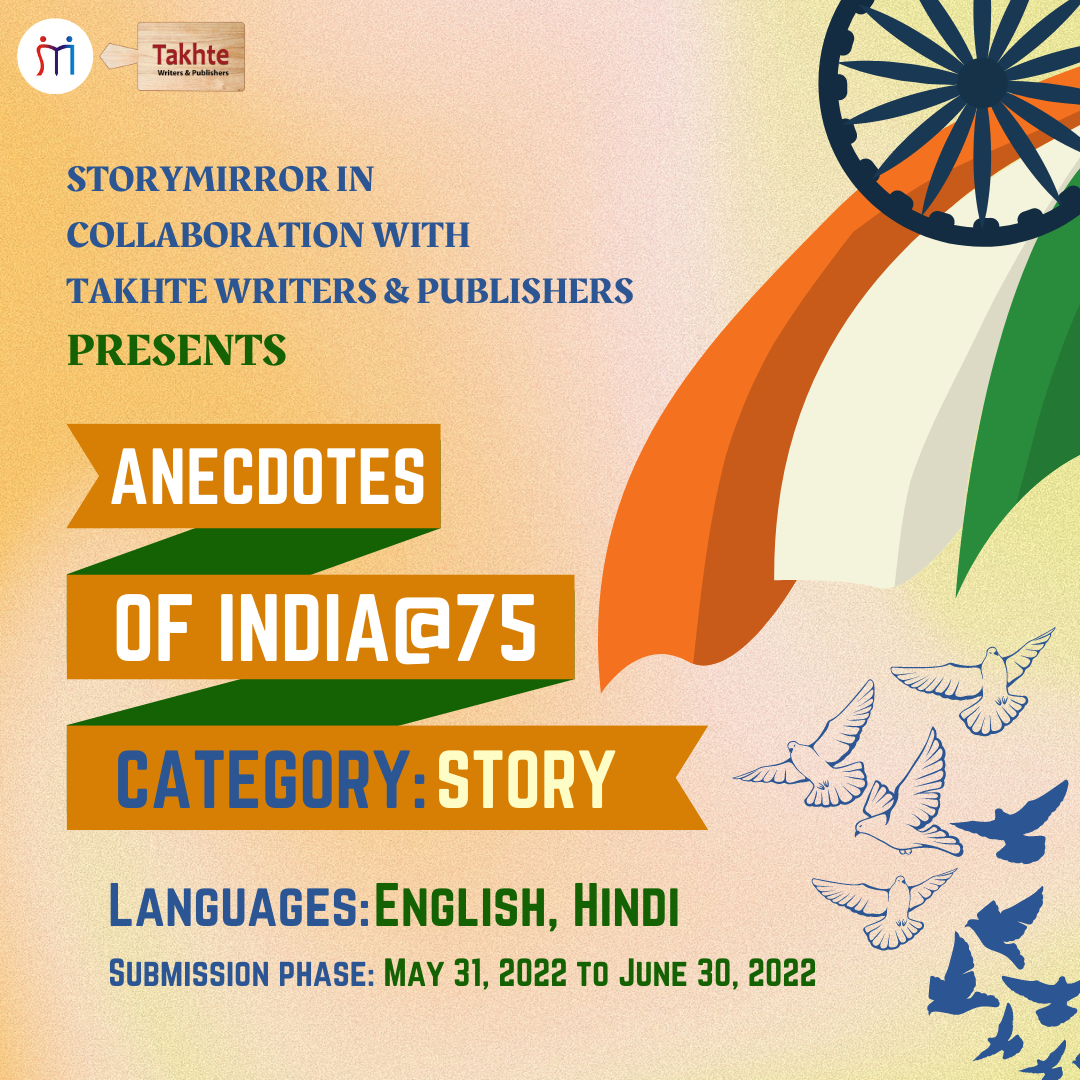
India, an enigmatic and epochal country, has an unparalleled and flourishing cultural legacy, which we are proud to represent. It is steadfast and unyielding, and it will never be lost to future generations. This year marks the 75th anniversary of India’s independence.
Writers are synonymous with bringing about a renaissance, whether literary or social; they function as negotiators to mediate the country’s social and cultural difficulties and, at times, become reformists. They have a legendary imagination, a distinct voice, flawless creative control of wordplay, and the ability to represent reality.
Takhte Writers & Publishers in collaboration with StoryMirror launch the literary contest ‘Anecdotes of India@75′
‘Anecdotes of India@75’ acknowledge the unacknowledged. It could be a person or an incident adding to national ethos, and you as a writer feel that others should know about it. So, start thinking, exploring and writing it in a stimulating story.
Rules:
- Participants have to submit their content on the above theme.
- Winners will be decided on the basis of editorial scores.
- Participants should submit their original content. There is no limit to the number of content to be submitted.
- There is no word limit.
- There is no participation fee.
Categories: Story
Languages: English, Hindi
Prizes:
- Top 2 winners will be felicitated with the Coffee Table Book of Rs2500/- authored by Takhte Writers
- Top 20 winners in each language will be published in an ebook by StoryMirror.
- Winners will receive digital certificates of appreciation.
- All participants will receive a digital participation certificate.
Submission phase – May 29, 2022, to June 28, 2022
Declaration of Result: August 11, 2022
Contact:
Email: takhtevov@gmail.com
Phone/ WhatsApp: +91 9311845524
Short-story
Twisha and Alex on Moon
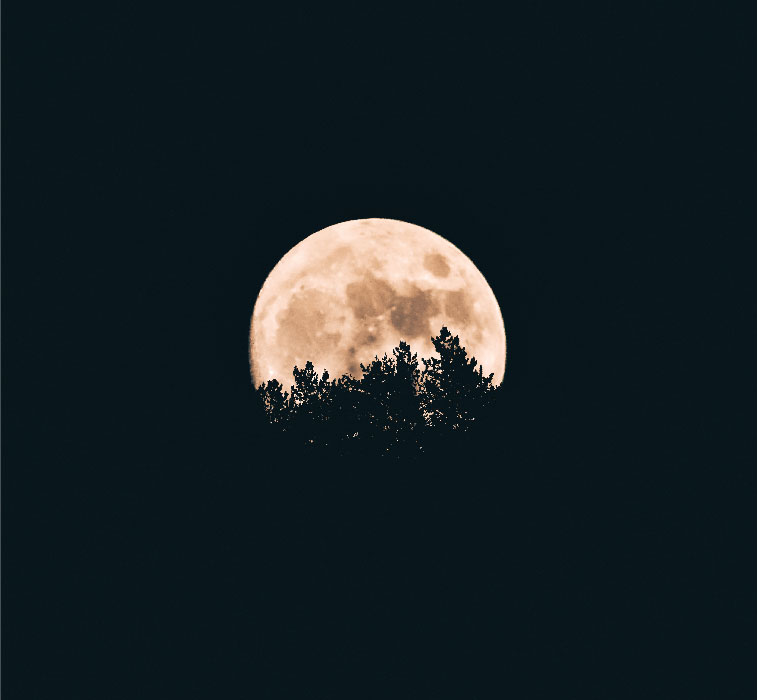
Reyaansh Bhardwaj
Scottish High International School
Gurugram
Grade 4
Alex was in his science lab carrying out his usual experiments. But, this time, he had thought of making a robot, which he wanted to gift to King Andrew during his birthday celebration. At that moment, Twisha came into the lab with Oreo.
Twisha, a year younger than Alex, is a sweet, pretty and short-tempered cousin. She asked Alex about his new experiment and shared her thoughts about going to the Moon.
Alex said, “Wow! Moon. I know you always wanted to go there. However, right now, going to the moon is more like a dream as we do not have a spacecraft. One day, I will take you to the moon”.
“One day! Seriously Alex. It doesn’t seem that near now. I surely want to go now,” said Twisha.
“Oh, Twisha! Don’t lose heart. I just remembered that Dr Peter is a Rocket scientist. He lives in the U.S.A, and I’ll talk to him about it,” said Alex.
Twisha replied, “Don’t make it tough. I will take you there.”
Alex was wonderstruck and astonished and teased her, “You are not a scientist. Are you a magician? HA HA HA HA HA HA.”
Twisha frowned. Seeing her annoyed, Alex said, “Ok, ok, so when are we going? How are we going? For how long are we going? What are we taking along?
Oreo heard the word going. He whined as if he should not be forgotten in their plans.
Twisha replied, “So many questions in one go. Bro, relax. We’ll go after two days on the full moon night.“
Twisha patted Oreo and said, “My Lil pup, I’m sorry you can’t go this time, but I’ll treat you with your favourite bone and peanut butter.”
As planned, on the full moon night, they both go on the terrace; Twisha asks Alex to lie down on the spread carpet. It was attractive, multicoloured with stars on it
Alex gets grumpy, “Are you serious. Is this your plan? Just lying down, and we’ll reach the Moon.”
“Have patience, this carpet has magical powers, and it will take us to the moon,” said Twisha. Her mind is burdened and overworking how to calm Alex and end his curiosity. Then, as in a trance-like state, she can take him and bring him back quickly.
Twisha picks up the crystal ball and asks him to focus on it and take deep breaths.
In no time, Alex exclaims, “Wowww! We have finally landed. It’s giant. Twisha, you know other names of Moon, its Luna, Selena or say Artemis. Moon is the only natural satellite of our planet and the second brightest object in the sky after the sun. Any object on the Moon will weigh six times less than on Earth. It rests on the tallest mountain, the Mons Huygens. Twisha, you would have read too, that Neil Armstrong was the first person to set foot on the Moon.”
Alex, for hours, kept gaping and looking around in awe. He is surprised that Twisha has not spoken and asks her, “Hey! Why are you not saying anything? You also know so much. So you should share your learnings.”
Twisha giggles and pats Alex’s shoulder, “Hey, Bro, how are you doing? I think you completely enjoyed your visit to the Moon.” Alex rubbed his eyes and looked at her with his mouth open.
Photo Courtesy – aron-visuals-unsplash
-
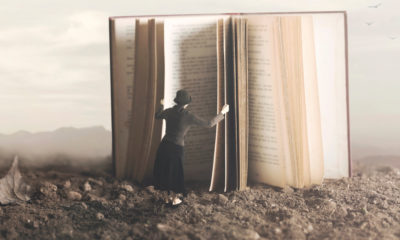
 Poems3 years ago
Poems3 years agoPoems
-
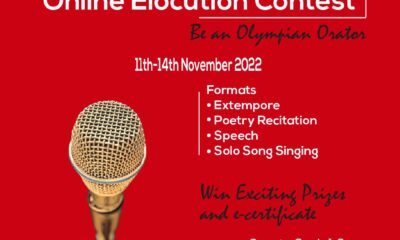
 Uncategorized2 years ago
Uncategorized2 years agoOnline Elocution Contest
-
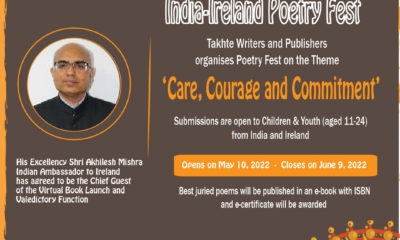
 Poems2 years ago
Poems2 years agoIndia-Ireland Poetry Fest
-

 Legal Talks3 years ago
Legal Talks3 years agoCompliances Relating to the Commercialization of Electronic Devices
-
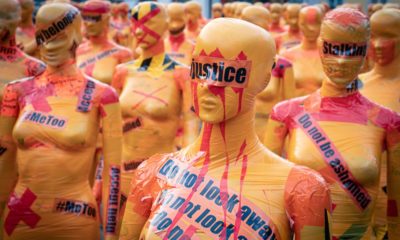
 Legal Talks3 years ago
Legal Talks3 years agoCUSTODIAL RAPE IN LIGHT OF THE MATHURA GANG RAPE CASE
-

 Art & Culture3 years ago
Art & Culture3 years agoThe Lore of the Days of Yore: Significance of History
-

 Short-story3 years ago
Short-story3 years agoBibek’s visit at his friend’s bungalow
-

 Uncategorized1 year ago
Uncategorized1 year agoPotential Navigators of Knowledge (PNK) Young Authors Awards








